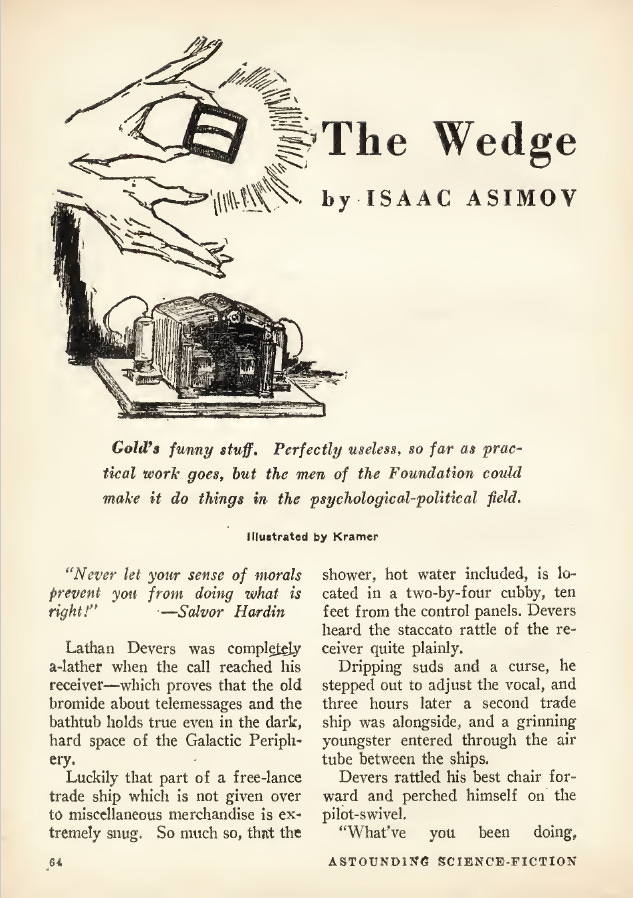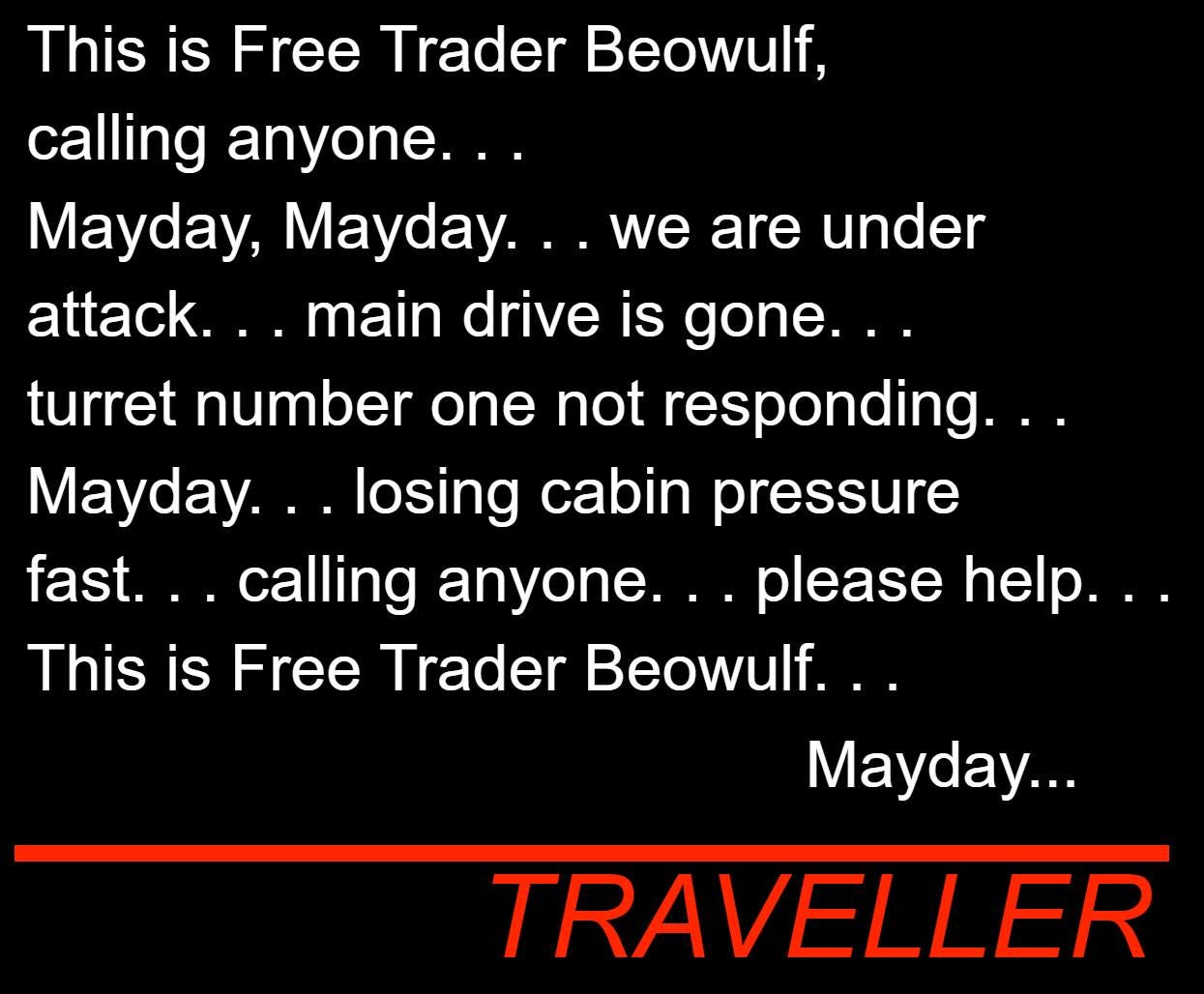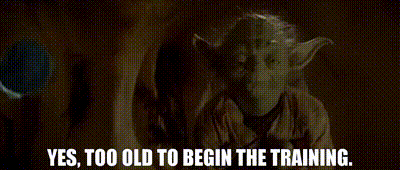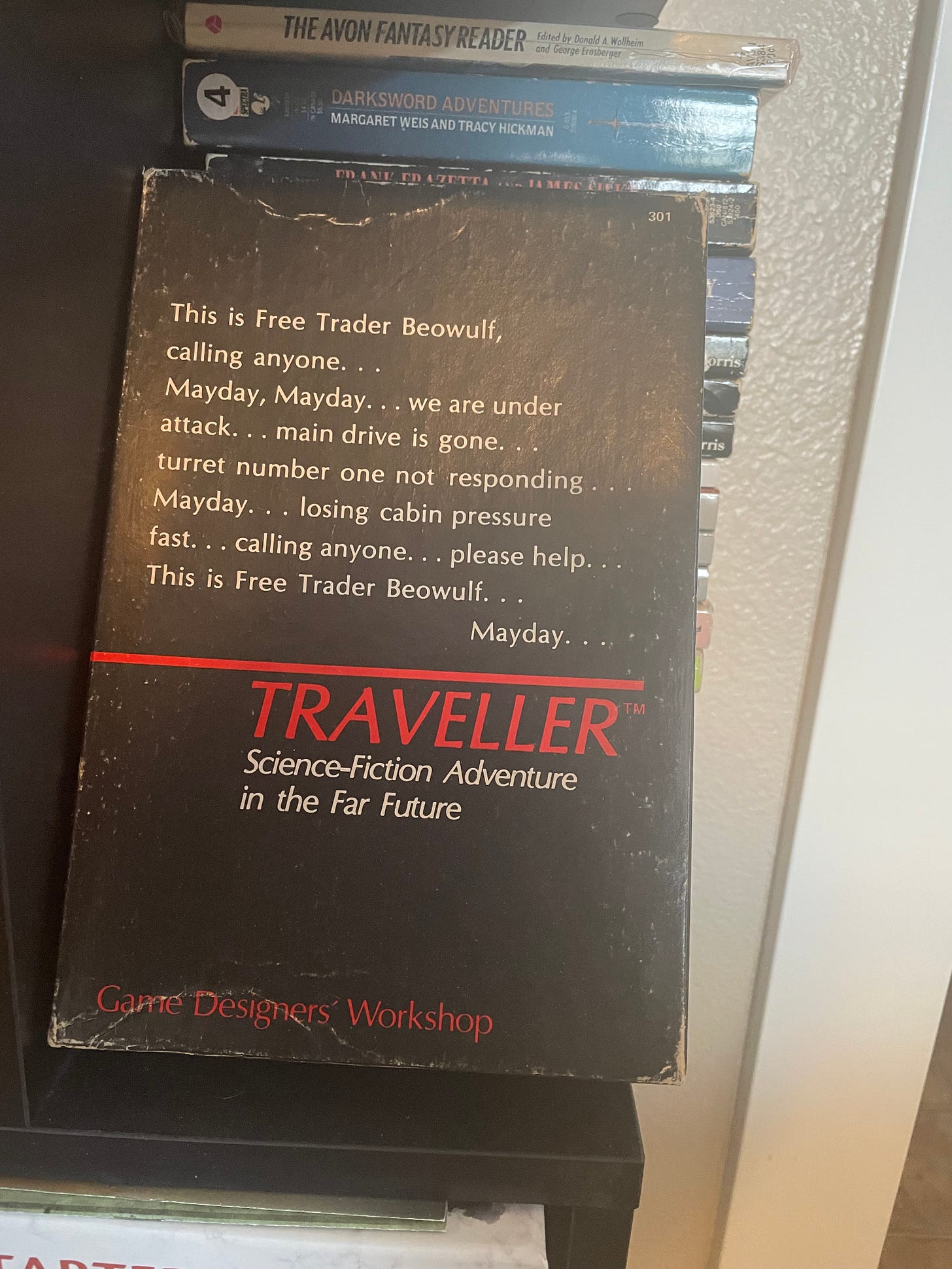Mayday! Mayday! This is Free Trader Beowulf!
Let's Celebrate One of the Best SF Roleplaying Games Ever Designed
I was in the process of my bi-weekly perusal of the Bundle of Holding website, when I noticed that they have Shannon Appelcline’s detailed history of the Traveller roleplaying game available for one-quarter the price in a short term bundle (only for the next few days, after that you’ll have to buy it for full price). Shannon’s Designers & Dragons series is a fantastic historical overview of the development of the role playing game hobby and This is Free Trader Beowulf makes a great companion piece. Get it from the Bundle if you can.
This interaction reminded me that today is the most important day in all of Traveller fandom.
Today is MayDay!
May 1st of every year holds a special place in the hearts of fans of the Traveller roleplaying game. This isn’t because it is the anniversary of the publication of the game, that was around July 22, 1977 at the Origins III gaming convention1, instead it’s because of the hook that inspired people to try the game at all. That hook is the brief message on the cover of the box that held the original Little Black Books.
That short box cover message contains a lot of information about the Traveller setting, all without going into any expository. There is enough content in that distress call alone to run a detailed and rich science fiction campaign.
Think about that for a moment. A marketing message that contains sufficient background information to run an entire science fiction campaign! That’s remarkable and the reason it is possible is that it builds on existing well known lore in science fiction fandom.
Fans of Asimov’s Foundation stories would instantly recognize from this message that Traveller is a science fiction role playing game. The references to “Free Trader” and “losing cabin pressure” echo the “The Traders” of the book series like Master Trader Eskel Gorov who was imprisoned by the people of Askone for interfering in local politics.

What Kind of SF Setting Does this Brief Broadcast Reveal?
Even for those who haven’t read Asimov’s tales, there is a lot of content to be mined. I think it would be fair to say that the original little black books of the Traveller roleplaying game are filled with suggestions for an implied setting, even as there is very little explicit setting material in those short pamphlets and you can get a free replica of the content of those LBBs right now.
The first thing we learn about the Traveller Universe from this brief blurb is that this is a science fiction setting where “free traders” exist. What “free trader” means exactly, if you aren’t an Asimov fan, may not be clear but it is a jumping point. There are people who do trade between worlds who are not affiliated with an established government.
It is also clear is that this is a dangerous job. We know this not because the crew of the Beowulf are losing cabin pressure and might perish, though that makes it clear enough. Instead, we know it because this free trader has more than one turret mounted on the space craft and they are under attack.
Is it by pirates? Is it by an interplanetary navy? We don’t know. We do know that the trader does think it is possible that someone who can help them might be within radio distance. Why else would they be broadcasting? We also know that this isn’t necessarily likely, because they are asking for “anyone” to help them.
That’s a lot of information and fuel for the imagination in one small blurb and that’s how Traveller, especially in the Little Black Books, rolls.
After you download and read the opening sentences of the Introduction, you’ll begin to get a more detailed picture of just how dire the situation is for the Beowulf.
Traveller deals with a common theme of science-fiction : the concept that an expanding technology will enable us to reach the stars and to populate the worlds which orbit them. The major problem , however, will be that communication, be it political, diplomatic, commercial, or private, will be reduced to the level of the 18th century, reduced to the speed of transportation.
No subspace broadcasts in Traveller, so the crew had better hope an ally is close by. Of course, that ally/”rescuer” might just be your group’s PCs. What better way to start a campaign than with this desperate call for help?
One Reason Traveller Caught On…Star Wars. MayDay and May the Fourth Be With You.
While it’s abundantly clear to any fan of Science Fiction’s Golden Age that Traveller was in part inspired by the tales of Isaac Asimov, but the game was published in 1977. While this publication date meant that Traveller was the third published science fiction roleplaying game, it also meant it came out at roughly the same time as Star Wars and was able to use that to build a core audience.
The first Science Fiction role playing game was James Ward’s Metamorphosis Alpha which combined science fiction “ark salvation” stories with post-apocalyptic sensibilities. The second was Ken St. Andre’s Starfaring that is a thematic mashup of Ralph Bakshi’s counter cultural animation, the underground comics of the late 60s and early 70s, and John Carpenter’s Dark Star making it very much a game of its time. I’m excluding Ken St. Andre’s Rollerball. Even though it was published in February of 1977, it was printed as a limited edition zine and not a full blown entry into the rpg marketplace.
Both Metamorphosis Alpha and Starfaring were published before the release of Star Wars, and neither had a setting or rules set that was a good fit for the film franchise. Traveller wasn’t a perfect fit either, but it was close enough for it to become the go to system for those who wanted to play something approximating Star Wars.
While the original Little Black Books didn’t have a full blown setting, the implied one was painted in broad enough strokes that Star Wars fans adopting seems a natural fit.
The abandoned Free Trader Beowulf may as well be the Millennium Falcon for those more versed in Star Wars than Foundation, or even those equally so. Once you crack open the Little Black Books, there are even more parallels.
There is a some form of Galactic Empire, a fact that is only implied in the original rules which are very open ended, but made explicit later. It’s implied by the sheer volume of military career choices provided in the lifepath character generation system, a system in which your character can die prior to even being able to be played. Military service, or being a scout in outer space, is very dangerous business. The lifepath system is a hallmark of the game and very influential to later roleplaying games.
There is also “The Psionics Institute” which can train certain characters to use various mental powers (read as Jedi Powers) and that Institute is viewed with suspicion by the masses. Additionally, psionic potential diminishes as you age if you didn’t receive training at a young enough age. It’s important to note that the scope of psionics in Traveller isn’t exactly Star Wars-esque. Certain powers like teleportation can grow to extraordinary levels, while telekinesis will never get as powerful as Yoda in Empire Strikes Back.
There is the typical array of science fiction weapons like blasters etc., but more importantly characters might actually learn the “Blade” skill during character creation and swords in the equipment section. This alone makes it seem a perfect fit, even if the rules don’t include “laser” or “lightning” swords.
So, not a perfect fit, but if you are willing to do a little game design on your own and craft house rules, then it’s a good proxy in a time before there were other systems.
I could go on and on about Traveller, and a topic worthy of investigation is its lack of exponential character power growth that you see in other roleplaying games, but I’ll just finish by saying you should do yourself a favor and buy a copy. Oh, and you can make a couple of characters before hand to see if any die during character creation even before you buy the books.
Two years ago, Patrick Buechner published a celebration of MayDay in his The Soloist - an indie RPG newsletter. Check it out!
The Mechanics
Given that Traveller was originally released in 1977, and given how closely its “format” matched that of D&D, it’s amazing how different the mechanics are from those of D&D. While the lifepath system does include a number of careers that player characters might have participated in before becoming adventurers, Traveller has no character class system. It is purely a skill based game, but even here it is unique.
The “defining” game of skill-based systems, Runequest, has a huge skill list and every player character has some level of proficiency with the vast majority of the skills. In other words, players have some level of skill in a wide variety of areas in Runequest and other Basic Role Play games. Not so in Traveller. Your character will be lucky to have 3 to 6 skill selections and if you keep re-enlisting to learn more skills, your character might just die in the character creation process. Yep, your characters can die as you create them in old school Traveller.
The lifepath system creates backstories that matter for beginning PCs. Your character might die during creation, but it will have a backstory and that backstory will affect play. In D&D games, I’ve started thinking that handling backstories the way they are handled in BG3 might be the best modern approach, post on that soon, because I don’t like the disconnect between an epic backstory and starting at first level. In Traveller, there are no levels but if your character has lived long enough, and traversed the lifepath, they will have a backstory and it will determine how good they are at tasks.
The game uses a very simple task resolution system that it then proceeds to make complex via the addition of several modifiers and wargame terminology. Sure, the basic mechanic for Traveller is “roll 2d6, add your skill bonus, and compare that to a target number.” Very simple, but then the modifiers come into play or should I say DMs. In D&D the term DM means Dungeon Master. In wargames, it means Die Modifier. DM+ means a bonus and DM- means a penalty. How much of one depends. Are you strong enough to use that sword really well? DM+ 1. Are you too weak DM -2. How about the dagger? Those numbers are different for daggers you know.
As complex as they make the very simple system, it’s still a simple system at heart and that makes it fun and easy to teach and play. I highly recommend Traveller.
Your Turn
What are you doing between MayDay and May the Fourth Be With You?
Appelcline, Shannon (2024) This is Free Trader Beowulf, Mongoose Publishing, Swindon, United Kingdom, pg. 24









Happy Mayday Christian!